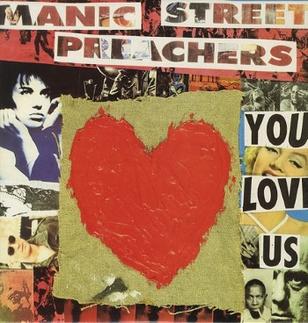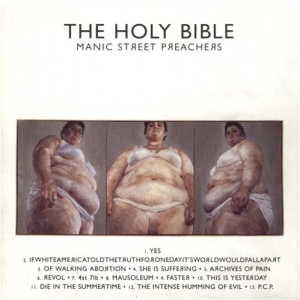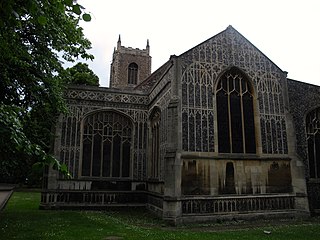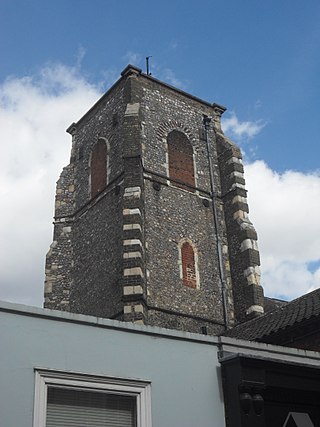
Norwich is a cathedral city and district of the county of Norfolk, England, of which it is the county town. It lies by the River Wensum, about 100 mi (160 km) north-east of London, 40 mi (64 km) north of Ipswich and 65 mi (105 km) east of Peterborough. The population of the Norwich City Council local authority area was estimated to be 144,000 in 2021, which was an increase from 143,135 in 2019. The wider built-up area had a population of 213,166 in 2019.

Manic Street Preachers, also known simply as the Manics, are a Welsh rock band formed in Blackwood, Caerphilly, in 1986. The band consists of Nicky Wire and cousins James Dean Bradfield and Sean Moore. They form a key part of the 1990s Welsh Cool Cymru cultural movement.

James Dean Bradfield is a Welsh singer-songwriter, musician and record producer. He is known for being the lead vocalist and guitarist for the Welsh alternative rock band Manic Street Preachers. His cousin Sean Moore is also a member.

Nicholas Allen Jones, known as Nicky Wire, is a Welsh musician and songwriter, best known as lyricist, bassist and secondary vocalist of the Welsh alternative rock band Manic Street Preachers.

Richard James Edwards, also known as Richey James or Richey Manic, was a Welsh musician who was the lyricist and rhythm guitarist of the alternative rock band Manic Street Preachers. He was known for his dark, politicized and intellectual songwriting which, combined with an enigmatic and eloquent character, has assured him cult status. Edwards has been cited as a leading lyricist of his generation, leading the Cool Cymru movement.

"You Love Us" is a song by Welsh alternative rock band Manic Street Preachers. It was initially released as a single on 7 May 1991 by Heavenly. The song was re-recorded and released on 20 January 1992 by Columbia Records as the third single from the band's debut studio album, Generation Terrorists.

"Motown Junk" is the second single by Welsh alternative rock band Manic Street Preachers, released on 21 January 1991 by Heavenly.

Ruby Trax – The NME's Roaring Forty is a compilation album released by the 'rock inkie' (newspaper) NME in 1992 to commemorate 40 years of publication. The album features 40 cover versions of classic Number 1 songs by popular bands of the era, though as the NME based it on their own chart, some songs did not reach number one on the British Market Research Bureau/Gallup chart. It was released in the following formats: three LPs (NME40LP), three CDs (NME40CD) or two cassettes (NME40MC), all having a total of 40 songs.

The Holy Bible is the third studio album by Welsh alternative rock band Manic Street Preachers, released on 30 August 1994 by Epic Records. While the album was being written and recorded, lyricist and rhythm guitarist Richey Edwards was struggling with severe depression, alcohol abuse, self-harm and anorexia nervosa, and its contents are considered by many sources to reflect his mental state. The songs focus on themes relating to politics and human suffering. The Holy Bible was the band's last album released before Edwards' disappearance on 1 February 1995.

Rewind the Film is the eleventh studio album by Welsh alternative rock band Manic Street Preachers, released on 16 September 2013 by Columbia Records. The sound is very different from previous records and is more acoustic-driven. It features guests Lucy Rose, Cate Le Bon and Richard Hawley.

Salisbury Arts Centre is a venue in Salisbury, Wiltshire, England. It is run by Wiltshire Creative, a charity which provides opportunities for members of the community to experience the arts.

St Peter Parmentergate, Norwich is a Grade I listed redundant parish church in the Church of England in Norwich.

St Michael Coslany, Norwich is a Grade I listed redundant parish church in the Church of England in Norwich. The building is located on Coslany Street, between Oak Street and Colegate.

St Mary the Less, Norwich is a Grade I listed redundant church located on Queen Street, Norwich.

St Gregory's Church, Norwich is a Grade I listed redundant parish church in the Church of England in Norwich.

St Edmund's Church, Norwich is a Grade I listed redundant parish church in the Church of England in Norwich.

St Mark's, Mayfair, is a Grade-I listed building, a former Anglican place of worship in North Audley Street, in the Mayfair district of London.

Thomas Rawlins (1727–1789) was an English sculptor, architect and architectural author, who specialized in funerary monuments.

Sir Peter Seaman (1662–1715), Knight Batchelor, of the City of Norwich in Norfolk, England, was a brewer who served as Mayor of Norwich 1707-8, Colonel of the City Corps and High Sheriff of Norfolk in 1710.





















